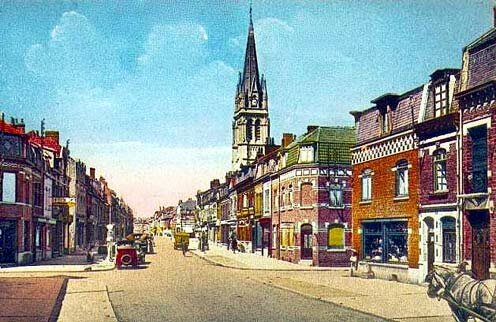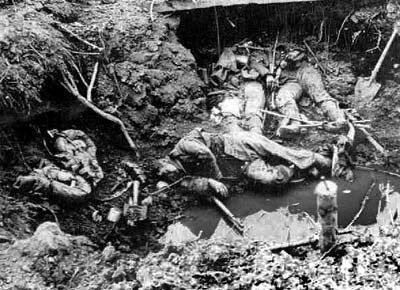
La Bassée at the time the poem was written
Click on the picture to see how the village looked in 1918
Sixteen years after the Great War, in 1934, Bernard Newman and Harold Arpthorp, two British veterans, together wrote 'The Road to La Bassée'.
It is an amazing poem, that describes their return to one of the former battlefields in France.
Bernard Newman had some writing experience. Later in his life he would join the English Secret Service and he would write a book on flying saucers. About Harold Arpthorp we know nothing.
La Bassée lies in France, southwest of Lille and about ten miles from the Belgian border. Here in the autumn of 1914 was fought one of the bloodiest battles of the Great War.
Strictly speaking the fight at La Bassée was a prolongation of the terrific contest at Ypres. Thrown back on the Marne in its initial drive on Paris, the German army, after a few weeks rest to recuperate and to mass artillery, lunged westward towards the sea, hoping to capture the channel ports and thus prevent British troops and supplies from reaching France. A million Germans participated in this drive.
 The struggle for the trenches of La Bassée was a part of this battle, which from beginning to end lasted nearly two months with never a day unmarked by desperate struggles.
The struggle for the trenches of La Bassée was a part of this battle, which from beginning to end lasted nearly two months with never a day unmarked by desperate struggles.
Picture: Dead Germans lying in front of a dugout at La Bassée.
It is estimated that at La Bassée alone the Germans fired $ 500,000 worth of shells into the trenches within a few days.
Life in these trenches became terrible beyond description. The dead lay thick, bodies without heads, without arms or legs, human flesh plastered by the explosion of shells against, and actually into, the walls. The dead lay for days, decomposing under the feet of the living.
Throughout these battles the Germans advanced in solid formation, often six or seven deep, and their losses were almost beyond belief. They carpeted the ground. Not a shell hole but had its quota.
The poem Bernard Newman and Harold Arpthorp wrote about revisiting this battlefield is less cynical than High Wood, the poem by Philip Johnstone in which tourists are pictured who wander over an old battlefield.
On the contrary - The Road to La Bassée is actually a joyful poem, with a striking, even rejoicing last line. Maybe it was written as a sort of reply-poem to the 1915 soldiers song on the Bassée road, which also describes the landscape and the civilian life. Newman and Arpthorp must have known that song. They problably even have sung it.
The Road to La Bassée
I went across to France again, and walked about the line,
The trenches have been all filled in - the country's looking fine.
The folks gave me a welcome, and lots to eat and drink,
Saying, 'Allo, Tommee, back again? 'Ow do you do? In ze pink?'
And then I walked about again, and mooched about the line;
You'd never think there'd been a war, the country's looking fine.
But the one thing that amazed me most shocked me, I should say
- There's buses running now from Bethune to La Bassée!I sat at Shrapnel Corner and I tried to take it in,
It all seemed much too quiet, I missed the war-time din.
I felt inclined to bob down quick - Jerry sniper in that trench!
A minnie coming over! God, what a hellish stench!
Then I pulled myself together, and walked on to La Folette -
And the cows were calmly grazing on the front line parapet.
And the kids were playing marbles by the old Estaminet -
Fancy kiddies playing marbles on the road to La Bassée!You'd never think there'd been a war, the country's looking fine -
I had a job in places picking out the old front line.
You'd never think there'd been a war - ah, yet you would, I know,
You can't forget those rows of headstones every mile or so.
But down by Tunnel Trench I saw a sight that made me start,
For there, at Tourbieres crossroads - a gaudy ice-cream cart!
It was hot, and I was dusty, but somehow I couldn't stay -
Ices didn't seem quite decent on the road to La Bassée.Some of the sights seemed more than strange as I kept marching on.
The Somme's a blooming garden, and there are roses in Peronne.
The sight of dear old Arras almost made me give three cheers;
And there's kiddies now in Plugstreet, and mamselles in Armentiers.
But nothing that I saw out there so seemed to beat the band
As those buses running smoothly over what was No Man's Land.
You'd just as soon expect them from the Bank to Mandalay
As to see those buses running from Bethune to La Bassée.Then I got into a bus myself, and rode for all the way,
Yes, I rode inside a bus from Bethune to La Bassée.
Through Beuvry and through Annequin, and then by Cambrin Tower -
The journey used to take four years, but now it's half an hour.
Four years to half an hour - the best speedup I've met.
Four years? Aye, longer still for some - they haven't got there yet.
Then up came the conductor chap, 'Vos billets s'il vous plait.'
Fancy asking for your tickets on the road to La Bassée.And I wondered what they'd think of it - those mates of mine who died -
They never got to La Bassée, though God knows how they tried.
I thought back to the moments when their number came around,
And now those buses rattling over sacred, holy ground,
Yes, I wondered what they'd think of it, those mates of mine who died.
Of those buses rattling over the old pave close beside.
'Carry on! That's why we died!' I could almost hear them say,
To keep those buses always running from Bethune to La Bassée!'
![]() More pictures of La Bassée in the war on this French webpage:
More pictures of La Bassée in the war on this French webpage:
![]() To the frontpage of The Heritage of the Great War
To the frontpage of The Heritage of the Great War